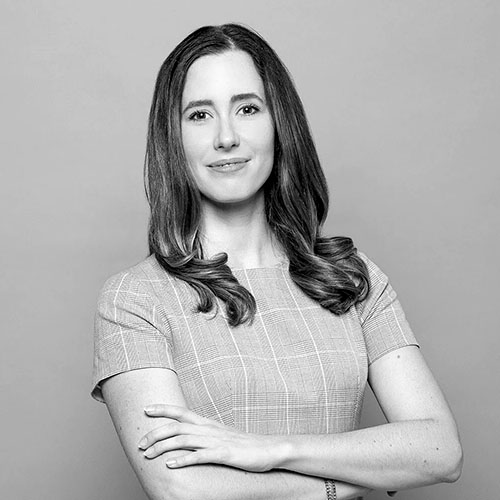2025 speakers
CIGF is proud to convene leaders across governments, the private sector, civil society, academia and the technical community to discuss the most pressing public policy issues facing the internet.
Check out the CIGF 2025 line-up!

Keynote
Byron Holland
Byron Holland has led CIRA as President & CEO since 2008. An expert in internet governance and a seasoned entrepreneur, he brings extensive C-level experience in both the private and not-for-profit sectors. Under Byron’s leadership, CIRA has evolved from a single-service registry into a globally recognized, multi-product commercial not-for-profit organization. Now one of the leading country code top-level domains (ccTLDs) in the world, CIRA manages over 3.4 million domains under management, with more than 30% of the world’s TLDs utilizing its DNS services.
Under Byron’s leadership, CIRA is also a founding member of a Technical Community Coalition for Multistakeholderism (TCCM), a group of technical operators committed to defending and strengthening inclusive, collaborative decision-making processes in global internet governance. Byron represents CIRA internationally in global policy work and has played a pivotal role in shaping key internet governance decisions.
He has held prominent leadership roles within the Internet Corporation for Assigned Names and Numbers (ICANN), including serving as Chair of the Customer Standing Committee and as both Chair and Vice-chair of the Country Code Names Supporting Organization (ccNSO). In March 2025, he joined the ICANN Board of Directors and currently serves on its Finance and Audit Committees.
Previously, Byron served on the Nominations Committee for the American Registry for Internet Numbers (ARIN) from 2019 to 2022. From 2021 to 2025, he served on the Board of the Council of European National Top-Level Domain Registries (CENTR), holding the role of Treasurer from 2024 to 2025. From 2023 to 2025, he was also a Board member and Vice-chair of TorIX, Canada’s largest internet exchange point.

Panel 1: Canadian Digital Sovereignty: The Government of Canada’s Digital Agenda
Michael Geist
Dr. Michael Geist is a law professor at the University of Ottawa where he holds the Canada Research Chair in Internet and E-commerce Law and is a member of the Centre for Law, Technology and Society. He has obtained a Bachelor of Laws (LL.B.) degree from Osgoode Hall Law School in Toronto, Master of Laws (LL.M.) degrees from Cambridge University in the UK and Columbia Law School in New York, and a Doctorate in Law (J.S.D.) from Columbia Law School.
Dr. Geist is the editor of several copyright books including The Copyright Pentalogy: How the Supreme Court of Canada Shook the Foundations of Canadian Copyright Law (2013, University of Ottawa Press), From “Radical Extremism” to “Balanced Copyright”: Canadian Copyright and the Digital Agenda (2010, Irwin Law) and In the Public Interest: The Future of Canadian Copyright Law (2005, Irwin Law), the editor of several monthly technology law publications, the author of a popular blog on iInternet and intellectual property law issues, and the creator of Law Bytes, one of Canada’s leading technology law podcasts.
Dr. Geist serves on many boards, including Internet Archive Canada and the EFF Advisory Board. He was appointed to the Order of Ontario in 2018 and has received numerous awards for his work including the Canadian Journalists for Freedom of Expression Vox Libera Award in 2018, the Kroeger Award for Policy Leadership and the Public Knowledge IP3 Award in 2010, the Les Fowlie Award for Intellectual Freedom from the Ontario Library Association in 2009, the EFF’s Pioneer Award in 2008, and Canarie’s IWAY Public Leadership Award for his contribution to the development of the Internet in Canada.

Panel 1
Vass Bednar
Vass Bednar is the Managing Director of the Canadian SHIELD Institute for Public Policy, a next-generation policy studio focused on unlocking Canada’s full potential. Recognized as one of Canada’s sharpest policy minds, she is known for cutting through corporate jargon and bureaucratic inertia to ask the questions others won’t.
With a career spanning think tanks, government, academia and media, Vass has built a reputation as a fearless and independent voice on the policies that shape our daily lives. In 2020, she co-founded the Master of Public Policy in Digital Society program at McMaster University, where she also taught courses on policy design.
Vass is a Senior Fellow at the Centre for International Governance Innovation, a Fellow at the Public Policy Forum, and an advisor to both the Canadian Anti-Monopoly Project and Social Capital Partners. She is the co-author of The Big Fix: How Companies Capture Markets and Harm Canadians and a contributing columnist with The Globe and Mail’s Report on Business where she focuses on the policies, technologies, and corporate forces that shape our everyday lives and economic futures.

Panel 1
Mira Gillis
Mira Gillis serves as the Chief Operations Officer for Young Digital Leaders of Canada, which hosts the annual Canadian Youth Internet Governance Forum. She recently spent the past year completing an MSc in Media and Communications (Governance) at the London School of Economics and Political Science. While abroad, she was also selected for the NextGen@ICANN program and presented on the topic of "Accountability in Internet Governance" at ICANN83 in Prague, Czech Republic.

Panel 1
Ulrike Bahr-Gedalia
Ulrike Bahr-Gedalia, M.A., B.A., is a multilingual, award-winning innovator, entrepreneur and technology, business, and public policy executive with over 25 years of experience in the private, public, non-profit, and academic sectors. Originally from Germany, her global career spans six countries and five continents.
For the past five and a half years, Ulrike was the Senior Director, Digital Economy, Technology and Innovation at Canadian Chamber of Commerce, where she led federal policy files on artificial intelligence, cyber security, telecommunications, quantum, online safety, digital transformation, tech adoption and privacy and data protection, among others. Ulrike inaugurated and led the national Cyber Security Council, Future of Artificial Intelligence Council and Digital Economy Committee, featuring close to 200 organizations. From 2020-2022 Ulrike incepted and led the national Health Innovation Committee and established the Canadian Chamber’s biomanufacturing and life sciences portfolio. From 2023-2024, the Privacy and Digital Trade Council was added to Ulrike’s portfolio as well.
Prior to joining the Canadian Chamber, Ulrike was the President and CEO of Digital Nova Scotia for over seven years. Ulrike also worked at the Nova Scotia Provincial Government (economic development, international commerce and trade), including the Crown Corporation Innovacorp (now Invest Nova Scotia), and held a broad array of executive leadership roles at the headquarters of prominent multi-national technology corporations, small
and medium-sized enterprises, and start-ups across the globe, including Intel, Compaq/HP, McAfee, Madge Networks, Commtouch/Cyren, Nipendo, CarteNav, Seaside Wireless and Thorasys.
Ulrike is presently a member of The Canadian Internet Society’s (TCIS) Policy Committee, the Council of Canadian Academies (CCA) Expert Panel on the State of Science, Technology and Innovation in Canada, and the Governor General’s Innovation Awards (GGIA) Assessment Committee.
An avid advocate for EDI and careers in STEAM and a tireless connector, building bridges between people and jobs, industry and government, and companies and opportunities, Ulrike was recognized with the following features and awards: WXN Top 100 Most Powerful Women in Canada Hall of Fame; Atlantic Business Magazine Top 50 CEO; RBC Top 25 Canadian Immigrant; East Coast Top 25 Immigrant; Halifax Top 5 Immigrant Women Influencers; WCT Top 15 Leadership Excellence in Canada: Innovator; Progress Women of Excellence: Innovator/Entrepreneur; Canada’s Top 40 Change-Makers: Canadian Living Magazine; Mannesmann Teaching Award & Fulbright Scholarship while pursuing her M.A. in the United States. In 2017, Ulrike was one of the “Canada 150 Women” in the best-selling publication of the same name.
Ulrike is married with a son and daughter and moved to Canada from Israel in 2002. Ulrike has called Canada her home ever since and as a self-described “nature nerd”, can be found in the great outdoors pretty much every day.

Moderator
Duncan Cass-Beggs
Duncan Cass-Beggs is executive director of the Global AI Risks Initiative at CIGI, focusing on developing innovative governance solutions to address current and future global issues relating to artificial intelligence (AI). Duncan has more than 25 years of experience working on domestic and international public policy issues, most recently as head of strategic foresight at the Organisation for Economic Co-operation and Development (OECD).
During his six years as counsellor for strategic foresight at the OECD, Duncan led the organization’s efforts to better anticipate and prepare for future disruptions and emerging issues. This work involved leading collaborative strategic foresight initiatives to explore future scenarios and their implications in such areas as digital transformation, migration, climate change, governance and geopolitics. In 2021, Duncan and his team launched the OECD’s collaborative foresight initiative on emerging global existential risks, aiming to better inform governments and the international community on future global challenges that may require new approaches in international collaboration. A key focus of this work was on future global risks from advanced AI — work that is continuing as part of the OECD’s Expert Group on the Future of AI.
Prior to joining the OECD, Duncan worked in a variety of positions with the Government of Canada, most recently as director of strategic foresight (2013–2016) at Policy Horizons Canada. This involved leading government-wide initiatives exploring the future of various global forces of transformation, such as technological development and the rise of Asia, and their implications for Canada’s society, economy and role in the world. Previously, Duncan served as director of medium-term policy and emerging issues (2004–2013) in the Learning Policy Directorate of Employment and Social Development Canada, where his team tracked emerging trends and potential disruptions, and developed forward-looking strategies to support Canadians in acquiring the knowledge and skills needed to flourish in the future economy and society. Duncan also worked in a variety of public policy areas, including organizational transformation, federalism, the social economy, homelessness, community development, persons with disabilities, international relations and international development.
Duncan completed an M.Sc. in the politics of Asia and Africa from the School of Oriental and African Studies at the University of London, and earned a B.A. in economics and political science from McGill University.

Panel 2: Cybersecurity in Canada
Jon Ferguson
Jon Ferguson leads the Cybersecurity & DNS services unit at CIRA that builds upon the organization’s world class DNS services to provide cybersecurity services and training to Canadians and the global internet community.
For the past 15 years, Jon has worked in product leadership roles for organizations building globally distributed Internet of Things and Cybersecurity solutions. Prior to joining CIRA, he was Director of Public Key Infrastructure & IOT at Entrust where he helped launch a suite of products including next generation, SaaS based security solutions to the company’s global customer base.
Jon holds a Bachelor of Geographic Analysis degree from Toronto Metropolitan University. Jon is an avid sports fan and you will find him on the golf course, baseball field playing in the local Fastball league or engaged in other outdoor activities with his two sons and wife.

Panel 2
Andre Arbour
Andre Arbour is Director General of Telecommunications and Internet Policy at Innovation, Science and Economic Development Canada. He is responsible for leading policy development on various telecommunications matters including Internet and mobile competition, rural access, net neutrality and international internet governance. He also has broader responsibilities for the Telecommunications Act and interface with the Canadian Radio-television and Telecommunications Commission (CRTC) concerning telecommunications.
Prior to his current role he occupied a series positions working in telecommunications and public policy. Past initiatives including leading development of Canada's first national Connectivity Strategy, leading policy for $4 billion in connectivity program funding, and policy development on various issues related to competition and consumer protection.
Andre graduated with a Bachelor of Arts in History and Political Science from the University of Toronto and has a Master’s in Public Administration from Carleton University.

Panel 2
Kate Robertson
Kate Robertson is a senior research associate at the Citizen Lab, Munk School of Global Affairs & Public Policy at the University of Toronto. Her research explores the intersection of law, policy and technology, and focuses on transparency and accountability mechanisms relevant to the relationship between corporations and state agencies in the use of personal data and other surveillance activities. She has published human rights reports on emerging technologies, and has represented public interest organizations in digital rights cases before the Supreme Court of Canada. She draws on former experience as a law clerk of the Supreme Court, and subsequently, as a criminal lawyer in Canada’s justice system.

Moderator
Brent Arnold
Brent J. Arnold is the founder of Capstan Legal and a seasoned litigator with over 20 years of experience specializing in cybersecurity, privacy and commercial litigation. He has appeared before all levels of court in Ontario, including the Supreme Court of Canada, and has been recognized in Best Lawyers™ in Canada and the Lexpert Directory. Brent is a respected thought leader and speaker, serving as Chair of the Canadian Internet Society and holding leadership roles in multiple legal and technology organizations. His expertise lies at the intersection of law and technology, where he provides practical guidance on managing cyber risk and data breach incidents.

Keynote 2
Marie-Julie Desrochers
As Executive Director of the Coalition for the Diversity of Cultural Expressions, Marie-Julie Desrochers fosters the concerted action and mobilization of the Canadian cultural community in the protection and promotion of the diversity of cultural expressions. She is also Secretary General of the International Federation of Coalitions for Cultural Diversity, which has led her to participate actively, in UNESCO's work on the 2005 Convention for the protection and promotion of the diversity of cultural expressions, and to take part in working groups linking culture and sustainable development. Previously, she worked at the Association québécoise de l'industrie du disque, du spectacle et de la vidéo (ADISQ), notably in regulatory affairs and research. She holds a master's degree in literary studies, a bachelor's degree in French-language literature and a diploma in media art and technology

Panel 3: AI governance: the next frontier for digital policy
Ashley Casovan
Ashley is a recognized technology policy expert who has dedicated her career to ensuring data and technology are used in a positive way which promotes innovation while protecting the public. She currently serves as the Managing Director of IAPP’s AI Governance Center, a professional association working to shape, define, and promote positive AI governance practices. Prior to joining IAPP she was the Executive Director of the Responsible AI Institute (RAII), a multi-stakeholder non-profit dedicated to mitigating harm and unintended consequences of AI systems through the development of a certification and standards for AI systems. Her interest and work in AI policy began at the Government of Canada when she was Director of Data and Digital at the Treasury Board Secretariat. Here she led the development of the first set of rules for how the public service uses AI in a responsible manner which remains a gold standard for AI policy globally.
Appointed as an Adjunct Professor at Carleton’s School of Public Policy and Administration, Ashley continues to do research at the intersection of data, AI, standards, and policy. Her interests and expertise have allowed her to remain connected to the key issues facing AI regulation and oversight.
Recognizing the importance of sharing knowledge and gaining insight from the global AI ecosystem, Ashley is a member of OECD’s Network of Experts (ONE AI), Co-Chair of Standard Council of Canada’s AI and Data Standards Collaborative, an executive board member of the International Centre of Expertise in Montréal on Artificial Intelligence (CEIMIA), and a member of the IFIP/IP3 Global Industry Council (GIC) within the UN. She also lends her time as an expert advisory committee member for the Global Index on Responsible AI, the premier law and policy journal, AIRe, and various academic initiatives.

Panel 3
Mark Schaan
Mark Schaan is the Associate Deputy Minister at Innovation, Science and Economic Development Canada (ISED), confirmed in October 2025, which builds on the direction from the Prime Minister on July of 2025 that he acts as the direct Deputy support to the Minister of Artificial Intelligence (AI) and Digital Innovation. He was the Deputy Secretary to the Cabinet – Artificial Intelligence in July of 2024. In this role, he supported the overall AI agenda, seeking to position Canada for leadership in its responsible development and use.
Prior to this, Mark served as Senior Assistant Deputy Minister for Strategy and Innovation Policy at the Department of Innovation, Science and Economic Development (ISED). In this role he led on the overall micro-economic and innovation agenda, including supporting the development of the department's horizontal policy and strategic priorities, including in international affairs, telecommunications, economic security, and all aspects of marketplace frameworks.
Mark’s career has been highlighted by this cross-cutting policy and framework effort, including leading major consultations and reforms, including for telecommunications, investment review, intellectual property, bankruptcy and insolvency, privacy and AI. Mark’s public service career has included roles across the policy spectrum, as well as leading on revitalizing the public service through innovative recruitment models.
Mark earned his BA (Honours) from the University of Waterloo in Political Science with an Honours Option in Peace and Conflict Studies in 2002, where he studied as a Loran Scholar. Mark earned his MPhil in Comparative Social Policy, conferred in 2004, and his DPhil in Social Policy, conferred in 2010 from the University of Oxford, where he studied as a Rhodes Scholar. Mark is also actively involved in his community: chairing the board of the Ottawa Art Gallery,
continued involvement with the Loran Scholars Foundation, and previous leadership at the Ten Oaks Project for 2SLGBTQ+ youth and families.

Panel 3
Jaxson Khan
Jaxson Khan is CEO of Aperture AI, where he helps organizations navigate dual-use technologies including AI, quantum computing, cybersecurity, and space systems. Aperture provides strategic consulting to major corporations, executive education for public sector leaders, and playbooks on AI adoption for SMEs and non-profits. Jaxson is a Senior Fellow at the University of Toronto's Munk School of Global Affairs & Public Policy, where he teaches a master's level course on AI policy, and a Board Director of the Human Feedback Foundation.
Prior, Jaxson served as Senior Policy Advisor to Canada's Minister of Innovation, Science, and Industry, where he played a pivotal role in developing a $2.4 billion investment into AI compute, adoption and safety. His files included quantum computing, semiconductors, competition, intellectual property and innovation policy. Jaxson Khan also served as Chief of Staff at LawAI, an independent think tank that conducts research and advises across sectors on AI, law, and policy.
Before government, Jaxson worked in several startups including as Director of Growth at Fable, an accessibility technology company. He also hosted the Microsoft-sponsored AskAI podcast for multiple seasons. Jaxson holds an Executive MBA from Quantic School of Business and Technology and a BA from Huron University, where he was recognized with an Alumni Award of Distinction and studied as a 3M National Student Fellow.

Moderator
Victoria Kuketz
Victoria Kuketz is a 2025 Obama Foundation Scholar, one of 11 in the world advancing trust building on behalf of the foundation. Her mission is to accelerate innovation, inclusion, and the protection of democracy.
As Director of Corporate Engagement at Catalyst, a global nonprofit, Victoria advises Fortune 500 corporations on the Future of Work and Responsible AI. She hosts the Catalyst podcast Breaking with Tradition and Democracy Dialogues at TMU's Democratic Engagement Exchange. Victoria is also the Public Policy Forum's Digital Democracy Fellow and a former Civic Action Diverse City Fellow. She holds an HBA and a Master's degree from the University of Toronto.

Panel 4: Towards WSIS+20
Charles Noir
Charles Noir leads CIRA’s international and domestic policy and advocacy. He is also responsible for Net Good, a collection of programs focused on closing digital divides and addressing Canada’s most pressing internet challenges. Before joining CIRA, Charles spent more than 15 years with the Government of Canada, where he worked on internet, telecommunications, and technology policy and led international negotiations. He holds a PhD in Management (Information Systems) from the University of Cambridge, an MSc from the London School of Economics and a BA in Communication from Simon Fraser University.

Panel 4
Dana Cramer
Dana Cramer is one of Canada’s most notable young internet leaders and is a nationally and internationally recognized researcher and writer. She is the founder, president, and CEO of the Young Digital Leaders of Canada, which is recognized by the United Nations Internet Governance Forum (IGF) as Canada’s national Youth IGF coordinator. She also founded and coordinates the World Summit on the Information Society Youth Caucus, which has brought youth from around the world together to advocate for youth recognition in future global digital governance agreements at the UN. Dana is completing her PhD at Toronto Metropolitan and York Universities where she studies geopolitics and multistakeholder impact in Internet governance.

Panel 4
Isra Rosas
Isra Rosas is the Director of Partnerships and Internet Development at the Internet Society. In this role, he collaborates with partners across the multistakeholder community to ensure that the Internet remains open, globally connected, secure, and trustworthy. He is part of the team leading the Internet Society's engagement in the WSIS+20 review and related United Nations processes.
Prior to joining the Internet Society, Isra served as an Internet policy analyst for Mexico's National Digital Strategy Coordination. There, he was involved in organizing the 2016 Internet Governance Forum, participated in the WSIS+10 review, and represented Mexico in both the ICANN Governmental Advisory Committee and the IGF Multistakeholder Advisory Group.
With a background in telecommunications and electronics, Isra focuses on fostering practical collaboration between technical and policy communities, emphasizing the conditions that enable effective multistakeholder cooperation.

Panel 4
Becky McGilley
Becky McGilley is Senior Director for Government Engagement Operations at ICANN, where she leads strategic initiatives to strengthen ICANN’s engagement with governments, regulators and intergovernmental organizations worldwide. She is currently co-directing ICANN’s work for the WSIS+20 review, coordinating across global stakeholders to ensure the technical community’s voice is represented in this important United Nations process.

Panel 4
Kelly Anderson
Kelly Anderson (BScS University of Ottawa, MA Norman Patterson School of International Affairs) currently serves as Director for International Cyber Policy at Global Affairs Canada.
Ms. Anderson joined the Department of Foreign Affairs and International Trade in 1997.
At Headquarters, she has worked in a variety of assignments including Deputy Director for NATO, OSCE and European Defence Cooperation; Deputy Director for Conventional, Chemical and Biological Weapons; and, as Deputy Director for Space Policy and Regulation.
She has served overseas at the Canadian Embassies in Belgrade, Serbia and Washington, DC. She was Deputy Permanent Representative of Canada to the Conference on Disarmament in Geneva from 2011-2014 and, most recently, served as Counsellor and Head of the Foreign Policy and Diplomacy section of the Canadian Embassy to Austria.

Moderator
Jenna Fung
Jenna is an internet governance enthusiast and a public policy changemaker. Her work bridges the technical layers of internet infrastructure with public participation in policymaking. Since 2018, she has taken on influential and leadership roles in the United Nations Internet Governance Forum (IGF) youth community and the Internet Corporation for Assigned Names and Numbers (ICANN). Professionally, Jenna wears many hats: she is a Senior Campaigner at OpenMedia and the Program Director of NetMission.Asia, a youth-led network advancing internet governance in the Asia-Pacific region. She also writes Jen Z issues, a newsletter exploring the intersection of digital rights and public policy. Born and raised in Hong Kong, Jenna now calls Toronto home. Outside of her advocacy work, she is a flamenco dancer, an avid reader, and a devoted cat lover.
